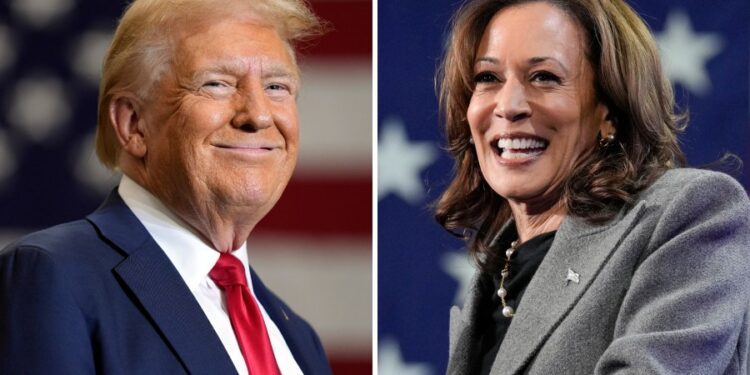
(NewsNation) — Polls show former President Donald Trump and Vice President Kamala Harris are dead even heading into Election Day, and betting markets have also become closer in recent days.
Unlike polling averages, which are primarily based on aggregated survey data, prediction markets offer insight into where people are putting their money. Those markets allow users to wager on the outcomes of future events.
Betting platforms like Kalshi, Polymarket and PredictIt have shown Trump as the favorite since mid-October, which remains the case, but Harris’ chances have improved recently.
Kalshi, a prediction market startup, shows Trump with a 53% chance of winning, compared to 47% for Harris, as of Nov. 4 at 11 a.m. A week ago, Trump was at 60%. Nearly $200 million has been wagered so far, according to Kalshi.
Polymarket — which has seen more than $3 billion in bets on the election — showed Trump favored at 56% compared to Harris at 44%, as of midday Nov. 4. Last week, Trump was above 66% at one point.
Another platform, PredictIt, showed Harris with an edge. A contract for a Harris win was priced at 54 cents versus 53 cents from Trump around 11 a.m. Nov. 4. That’s an improvement for Harris from a week ago when Trump was at 59 cents, and Harris was at 45 cents.
The RealClearPolitics betting average showed Trump with a 56% chance of winning and Harris at 43% as of Nov. 4.
Note: Betting odds change from minute to minute, and the current percentages may not be reflected above.
Are betting markets more reliable than polls?
A U.S. appeals court cleared the way for election betting last month, and many are looking to gambling markets as a reliable indicator of which way the election will go.
Proponents of prediction markets argue that they are better forecasters because they’re more responsive to breaking developments than polls. In other words: Bettors are economically motivated to factor in new information faster.
“Political betting sites are the best at predicting the wisdom of the crowd,” Thomas Miller, a data scientist at Northwestern University, told Fortune last month.
While it’s true betting markets have generally been good forecasters of U.S. elections, there are some caveats to keep in mind.
For one, betting platforms may be susceptible to manipulation. A Frenchman recently bet more than $30 million on Polymarket predicting a Trump victory, according to the Wall Street Journal.
“Even though volumes have surged on Polymarket this year, it is still small enough for one wealthy, opinionated individual to push prices around with a multimillion-dollar bet,” the WSJ noted.
Other research from academics at the University of Arizona and University of Kansas suggests “manipulating political stock markets is difficult and expensive to do for more than a short period.”
Michael Schwimer, founder of the sports betting consultant firm JAMBOS Analytics, dismissed betting manipulation concerns in a recent NewsNation interview. He pointed out that international bets for Trump can’t rig the markets any more than a big bet on the World Cup will affect how the game is played.
PredictIt has an $850 cap on individual bets, which limits the potential for a single person to sway the odds.
Liberty Vittert, a professor of data science at Washington University and the resident on-air statistician for NewsNation, also cautioned against reading too much into betting markets.
“[Bettors] are betting on nothing more substantial than the ‘vibes’ that once made Harris’ victory seem inevitable earlier this summer,” Vittert wrote in a recent op-ed for The Hill.
She added: “In 2016, Hillary Clinton was the 88 percent favorite to win on the Sunday before the election. If you had the bright idea of putting your life savings on the easy favorite in hopes of making a quick buck, you lost it all.”







